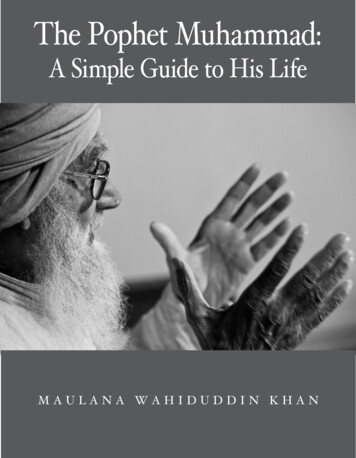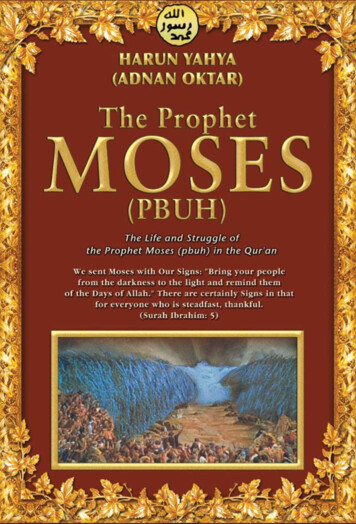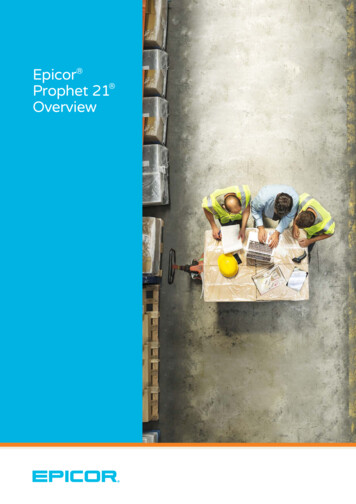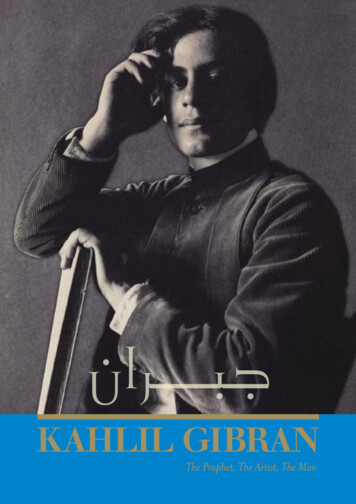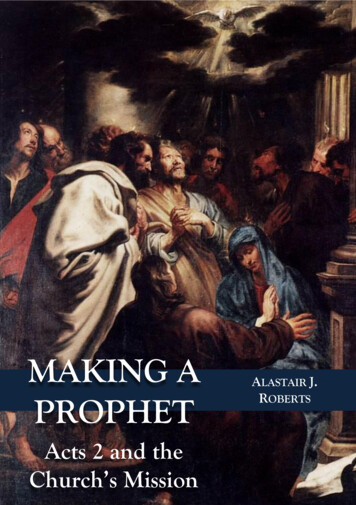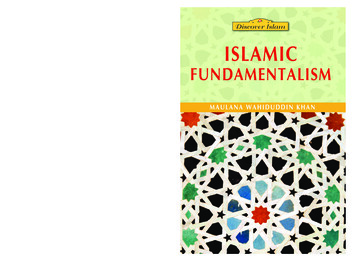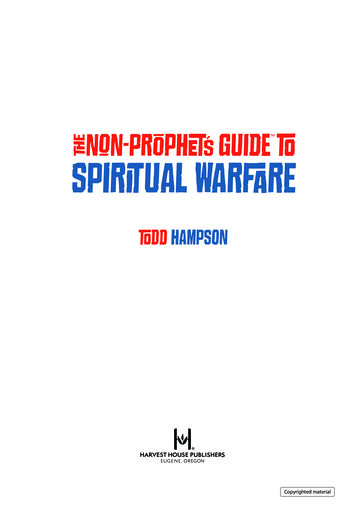
Transcription
The Life of the ProphetMuhammad(Peace and blessings of Allah be upon him) ٱ ٱلَّر ۡس َم ٰـ ِب ٱلَّر ِب ِبي ِب ۡس ِبي ِب In the name of Allah, the most Beneficent, the most MercifulAll Praise is due to Allah, the Lord of the Worlds, the [One Who] Sustains the Heavens and Earths,Director of all that is created, who sent the Messengers (may the peace and blessings of Allah beupon all of them) to rational beings, to guide them and explain the religious laws to them with clearproofs and undeniable arguments. I praise Him for all of His bounties. I ask Him to increase HisGrace and Generosity. I bear witness that there is none worthy of worship except Allah alone, whohas no partner, the One, Who Subdues, the Generous, the Forgiving. I bear witness that our leaderMuhammad is His servant and Messenger, His beloved and dear one, the best of all creation. Hewas honoured with the Glorious Qur’an that has been an enduring miracle throughout the years.He was also sent with his guiding Sunnah that shows the way for those who seek guidance. Ourleader Muhammad has been particularised with the characteristic of eloquent and pithy speech,and simplicity and ease in the religion. May the peace and blessings of Allah be upon him, theother Prophets and Messengers, all of their families and the rest of the righteous.NO Copyrights!!!This book can be printed or reproduced or utilized in any form or by anyelectronic, mechanical, or other means, now known or hereafter invented,including photocopying and recording, without permission from the publisher for the sake of spreading the True teachings of Islam.
The Life of the Prophet Muhammad (Peace and blessings of Allah be upon him)The Life of theProphet MuhammadPeace and blessings of Allah be upon himBy Leila Azzam & Aisha Gouverneur1
The Life of the Prophet Muhammad (Peace and blessings of Allah be upon him)2IndexHow It All Began . 3The Children of Ishmael . 7The Promise At Zamzam . 9The Elephant Refuses To Move. . 11The Prophet Is Born. 13A Time With Halimah. 15The Orphan's Childhood . 17The Prophet's Marriage . 19The Coming of The Archangel Gabriel . 22The First Muslimsr. 24The Troubles Begin . 27The King Who Believed . 29The Cruelty of Quraysh . 32The Year of Sorrow. 35The Night Journey And The Ascent To Heaven . 37The Treaty of ‘Aqabah. 39Al-Hijrah . 41Arrival In Yathrib . 44The Battle Of Badr. 46Uhud-Defeat Comes From Disobedience . 50The Battle Of The Trench . 54The Treaty Of Hudaybiyah . 59The Invitation . 63Entry Into Mecca. . 68The Lesson Of Pride At The Valley Of Hunayn . 72Tabuk-The Test Of Faith .75The Farewell Pilgrimage . 78The Prophet’s Death . 82GLOSSARY . 84
The Life of the Prophet Muhammad (Peace and blessings of Allah be upon him)3How It All BeganNearly four thousand years ago, in the Sumerian town of Ur in the valleyof the river Euphrates, lived a young man named Abraham. The people ofUr had once worshipped Allah but as time passed they forgot the truereligion and started praying to idols, statues made of wood or clay andsometimes even of precious stones. Even as a small child Abraham couldnot understand how his people, and especially his father, could makethese images with their own hands, call them gods, and then worshipthem. He had always refused to join his people when they paid respect tothese statues. Instead he would leave the town and sit alone, thinkingabout the heavens and the world about him. He was sure his people weredoing wrong and so alone he searched for the right way. One clear nightas he sat staring at the sky he saw a beautiful shining star, so beautifulthat he cried out: „This must be Allah!' He looked at it in awe for sometime, until suddenly it began to fade and then it disappeared. He turnedaway in disappointment saying: I love not things that set. (Qur'an 6.77)On another night Abraham was again looking at the sky and he sawthe rising moon, so big and bright that he felt he could almost touch it. Hethought to himself: This is my Lord. (Qur'an 6.78) But it was not longbefore the moon set as well. Then he said, Unless my Lord guide me, Isurely shall become one of the folk who are astray. (Qur'an 6.78)Abraham then saw the beauty and splendor of the sunrise and decidedthat the sun must be the biggest and most powerful thing in the universe.But for the third time he was wrong, for the sun set at the end of the day.It was then that he realized that Allah is the Most Powerful, the Creator ofthe stars, the moon, the sun, the earth and of all living things. Suddenly hefelt himself totally at peace, because he knew that he had found the Truth.When he said unto his father and his folk: What do you worship? Theysaid: We worship idols, and are ever devoted to them. He said: Do theyhear you when you cry? Or do they benefit or harm you? They said: Nay,but we found our fathers acting in this manner.He said: See now that which you worship, You and your forefathers!Lo! they are (all) an enemy to me, except the Lord of the Worlds. Whocreated me, and He guides me, And Who feeds me and waters me. Andwhen I sicken, then He heals me. And Who causes me to die, then givesme lift (again) And Who, I ardently hope, will forgive me my sin on theDay of judgement. (Qur'an 26.70-82)
The Life of the Prophet Muhammad (Peace and blessings of Allah be upon him)4One day, while all the townspeople were out, Abraham angrilysmashed all the idols with his right hand except for one which was verylarge. When the people returned they were furious.They remembered the things Abraham had said about the idols. Theyhad him brought forth before everyone and demanded, 'Is it you who didthis to our gods, 0 Abraham?' Abraham replied, But this their chief did it.Ask them, if they are able to speak.' The people exclaimed, 'You knowthey do not speak.' 'Do you worship what you yourselves have carvedwhen Allah created you and what you make?' Abraham continued, 'Doyou worship instead of Allah that which cannot profit you at all, nor harmyou?' (Qur'an 37.95-6)(Qur'an 21.66)Finally, Abraham warned them, Serve Allah, and keep your duty untoHim; that is better for you if you did but know. You serve instead ofAllah only idols, and you only invent a lie. Lo! those whom you serveinstead of Allah own no provision for you. So seek your provision fromAllah, and serve Him, and give thanks unto Him, (for) unto Him you willbe brought back.(Qur'an 29. 16-17)The people of Ur decided to give Abraham the worst punishment theycould find: he was to be burnt to death. On the chosen day all the peoplegathered in the centre of the city and even the King of Ur was there.Abraham was then placed inside a special building filled with wood. Thewood was lit. Soon the fire became so strong that the people were pushedback by the flames. But Allah said: “O fire, be coolness and peace forAbraham”. (Qur'an 21.69)The people waited until the fire had completely died down, and it wasthen that they saw Abraham still sitting there as though nothing hadhappened! At that moment they were utterly confused. They were not,however, moved by the miracle that had just happened before their veryeyes.Still Abraham tried to persuade his own dear father, who was namedAzar, not to worship powerless, un-seeing, un-hearing statues. Abrahamexplained that special knowledge had come to him and implored hisfather, 'So follow me and I will lead you on the right path. 0 my father!Don't serve the Devil.' But Azar would not listen. He threatened his sonwith stoning if he continued to reject the gods of Ur. He ordered Abrahamto leave the city with these words: 'Depart from me a long while.'Abraham said, 'Peace be upon you! I shall ask my Lord's forgiveness foryou. Surely He was ever gracious to me.‟ (Qur'an 19.43-7)
The Life of the Prophet Muhammad (Peace and blessings of Allah be upon him)5Imagine how terrible it must have been for him to leave his home, hisfamily and all that he knew, and set out across the wilderness into theunknown. But at the same time, how could he have remained amongpeople who did not believe in Allah and who worshipped statues?Abraham always had a sense that Allah cared for him and he felt Allahnear him as he traveled. At last, after a long hard journey, he arrived at aplace by the Mediterranean Sea, not far from Egypt. There he married anoble woman by the name of Sarah and settled in the land of Palestine.Many years passed but Abraham and his wife were not blessed with anychildren. In the hope that there would be a child, and in keeping withtradition, Sarah suggested that Abraham should marry Hagar, herEgyptian handmaid. Soon after this took place, Hagar had a little boynamed Ishmael. Some time later Allah promised Abraham another son,but this time the mother of the child would be his first wife, Sarah. Thissecond son would be called Isaac. Allah also told Abraham that from histwo sons-Ishmael and Isaac-two nations and three religions would befounded and because of this he must take Hagar and Ishmael away fromPalestine to a new land. These events were an important part of Allah'splan, for the descendants of Ishmael would form a nation from whichwould come a great Prophet, who would guide the people in the way ofAllah. This was to be Muhammad (pbuh), the Messenger of Allah (pbuh).From the descendants of Sarah's child, Isaac, would come Moses andJesus.So it was that Abraham, Hagar, and Ishmael left Palestine. Theytraveled for many days until finally they reached the arid valley of Baccalater to be called Mecca), which was on one of the great caravan routes.There was no water in the valley and although Hagar and Ishmael onlyhad a small supply of water left, Abraham left them there knowing Allahwould take care of them. Soon all the water was gone. The child began togrow weak from thirst. There were two hills nearby, one called Safa andthe other Marwah. Hagar went up one hill and looked into the distance tosee if she could find any water, but found none. So she went to the otherhill and did the same. She did this seven times. Then sadly she returned toher son, and to her great surprise and joy she found a spring of waterbubbling out of the earth near him. This spring, near which the motherand child settled, was later called Zamzam. The area around it became aplace of rest for the caravans travelling across the desert and in time grewinto the famous trading city of Mecca.From time to time Abraham traveled from Palestine to visit his familyand he saw Ishmael grow into a strong young man. It was during one ofthese visits that Allah commanded them to rebuild the Ka'bah-the veryfirst place where people had worshipped Allah. They were told exactly
The Life of the Prophet Muhammad (Peace and blessings of Allah be upon him)6where and how to build it. It was to be erected by the well of Zamzamand built in the shape of a cube. In its eastern corner was to be placed ablack stone that had fallen to earth from heaven. An angel brought thestone to them from the nearby hill of Abu Qubays. Abraham and Ishmaelworked hard to rebuild the Ka'bah and as they did so they prayed to Allahto send a Prophet from among their descendants. And when Abraham andIshmael were raising the foundations of the House, (Abraham prayed):'Our Lord! Receive this from us; Thou, only Thou, art the All-hearing, theAll-knowing; Our Lord! And make us submissive unto Thee and of ourseed a nation submissive unto Thee, and show us our ways of worship,and turn toward us. Lo! Thou, only Thou, art the Relenting, the Merciful.Our Lord! And raise up in their midst a messenger from among them whoshall recite unto them Thy revelations, and shall instruct them in theScripture and in wisdom and shall make them grow. Lo! Thou, onlyThou, art the Mighty, Wise. (Qur'an 2.127-9) When the Ka'bah wascompleted, Allah commanded Abraham to call mankind to pilgrimage toHis Holy House. Abraham wondered how anyone could hear his call.Allah said, 'You call and I will bring them.' This was how the pilgrimageto the Ka'bah in Mecca was established and when Muslims make thepilgrimage today they continue to answer the age-old call of Abraham.
The Life of the Prophet Muhammad (Peace and blessings of Allah be upon him)7The Children of IshmaelOver the years Ishmael's children themselves had children. Hisdescendants increased and formed tribes which spread out all overArabia. One of these tribes was called Quraysh. Its people never movedaway from Mecca and always lived near the Ka'bah. One of the duties ofthe leader of Quraysh was to look after those who came on pilgrimage tothe Ka'bah. The, pilgrims would come from all over Arabia and it was agreat honor to provide them with food and water.As time passed, however, the Arabs stopped worshipping Allahdirectly and started bringing idols back with them from the differentcountries they visited. These idols were placed at the Ka'bah, which wasno longer regarded as the Sanctuary of Allah, as Abraham had intended it.It was, however, still respected by the Arabs. Around this time the well ofZamzam disappeared beneath the sand. Also at this time, Qusayy, one ofthe leaders of Quraysh, became ruler over Mecca. He held the keys of thetemple and had the right to give water to the pilgrims, to feed them, totake charge of meetings, and to hand out war banners before battle. It wasalso in his house that Quraysh settled their affairs. After Qusayy's death,his son 'Abdu Manaf, who had become famous during his father'slifetime, took over the leadership of Quraysh. After him came his sonHashim. It is said that Hashim was the first to begin the two great caravanjourneys of Quraysh, one in the summer to Syria and the north, and one inthe winter to Yemen and the south. As a result, Mecca grew rich andbecame a large and important centre of trade.One summer Hashim went north to buy goods to sell in Yemen. Onhis way he stopped in Yathrib to trade in the market and there he saw abeautiful woman. She was Salma', the daughter of 'Amr ibn Zeid, whowas from a much respected family. Hashim proposed marriage to her andwas accepted because he was an honorable and distinguished man.In time, Salma' gave birth to a beautiful son and as some of his hairwas white they called him Shaybah, which in Arabic means grey-haired'.Mother and son stayed in the cooler, healthier climate of Yathrib,while Hashim returned to Mecca, but he would visit them each time hetook his caravan to the north. During one of these journeys, however,Hashim became ill and died. Shaybah, a handsome, intelligent boy, grewup in his uncle's house in Yathrib. He was proud of being the son ofHashim ibn 'Abdi Manaf, the head of Quraysh, guardian of the Ka'bahand protector of the pilgrims, even though he had not known his father,who had died while Shaybah was very young.
The Life of the Prophet Muhammad (Peace and blessings of Allah be upon him)8At Hashim's death his brother al-Muttalib took over his duties andresponsibilities. He traveled to Yathrib to see his nephew, Shaybah, anddecided that as the boy would one day inherit his father's place, the timehad come for him to live in Mecca. It was hard for Salma', Shaybah'smother, to let her son go with his uncle but she finally realized that it wasfor the best. Al-Muttalib returned to Mecca, entering the city at noon onhis camel with Shaybah behind him. When the people of Mecca saw theboy they thought he was a slave and, pointing at him, called out „Abd alMuttalib', 'Abd' being the Arabic for 'slave'.Al-Muttalib told them that Shaybah was not a slave but his nephewwho had come to live with them. From that day on, however, Shaybahwas always affectionately called Abd al-Muttalib. On the death of alMuttalib, who died in Yemen where he had gone to trade, 'Abd alMuttalib took his place. He became the most respected member of hisfamily, loved and admired by all. He was, however, unlike those Arabswho had given up the teachings of Abraham.
The Life of the Prophet Muhammad (Peace and blessings of Allah be upon him)9The Promise At ZamzamThe well of Zamzam, which disappeared when the Arabs placed idols atthe Ka'bah, remained buried under the sand. Thus, for many years thepeople of Quraysh had to fetch their water from far away. One day 'Abdal-Muttalib was very tired from doing this and fell asleep next to theKa‟bah. He had a dream in which he was told to dig up Zamzam. Whenhe woke up he was puzzled because he did not know what Zamzam was,the well having disappeared many years before he was born. The next dayhe had the same dream, but this time he was told where to find the well.'Abd al-Muttalib had one son at that time, and together they began todig. The work was so difficult that „Abd al-Muttalib made an oath toAllah that if one day he were to have ten sons to help him and stand byhim, in return he would sacrifice one of them in Allah's honor. Afterworking for three days they finally found the well of Zamzam. Pilgrimshave been drinking from it ever since. The years passed by and 'Abd alMuttalib did have ten sons. They grew into fine, strong men and the timecame for him to keep his promise to Allah. He told his sons about thepromise and they agreed that he had to sacrifice one of them To seewhich one it would be, they decided to draw lots, which was the customof Quraysh when deciding important matters. 'Abd al-Muttalib told eachson to get an arrow and write his own name upon it and then to bring it tohim. This they did, after which he took them to the Ka'bah where therewas a man whose special task it was to cast arrows and pick one fromamong them. This man solemnly proceeded to do this. On the arrow hechose was written the name of 'Abd Allah, the youngest and favorite sonof 'Abd al-Muttalib. Even so, the father took his son near the Ka'bah andprepared to sacrifice him.Many of the Quraysh leaders were present and they became very angrybecause 'Abd Allah was very young and much loved by everyone. Theytried to think of a way to save his life. Someone suggested that the adviceof a wise old woman who lived in Yathrib should be sought, and so 'Abdal-Muttalib took his son and went to see if she could decide what to do.Some of the Meccans went with them and when they got there the womanasked, 'What is the price of a man's life?' They told her, 'Ten camels', forat that time if one man killed another, his family would have to give tencamels to the dead man's family in order to keep the peace among them.So the woman told them to go back to the Ka‟bah and draw lots between'Abd Allah and ten camels. If the camels were chosen, they were to bekilled and the meat given to the poor. If 'Abd Allah was picked then tenmore camels were to be added and the lots drawn again and again untilthey finally fell on the camels.
The Life of the Prophet Muhammad (Peace and blessings of Allah be upon him)10„Abd al-Muttalib returned to the Ka‟bah with his son and the peopleof Mecca. There they started to draw lots between „Abd Allah and thecamels, starting with ten camels. „Abd al-Muttalib prayed to Allah tospare his son and everyone waited in silence for the result. The choice fellon „Abd Allah, so his father added ten more camels. Again the choice fellon „Abd Allah, so they did the same thing again and again, adding tencamels each time. Finally they reached one hundred camels, and onlythen did the lot fall on the camels. „Abd Allah was saved and everyonewas very happy. 'Abd al-Muttalib however, wanted to make sure that thiswas the true result so he repeated the draw three times and each time itfell on the camels. He then gave thanks to Allah that He had spared „AbdAllah's life. The camels were sacrificed and there was enough food forthe entire city, even the animals and birds. 'Abd Allah grew up to be ahandsome young man and his father eventually chose Aminah, thedaughter of Wahb, as a wife for him. It was a good match for she was thefinest of Quraysh women and 'Abd Allah the best of the men. He spentseveral months with his wife but then he had to leave her and travel withone of the caravans to trade with Syria. On his way back to Mecca fromSyria 'Abd Allah became ill and had to stop off in Yathrib to recover. Thecaravan, however, continued on its way and arrived back in Meccawithout him. On hearing of 'Abd Allah's illness, „Abd al-Muttalib sentanother son, al-Hareth, to bring 'Abd Allah back to Mecca, but he was toolate.When he arrived in Yathrib „Abd Allah was dead. Aminah was heartbroken to lose her husband and the father of the child she would soongive birth to. Only Allah knew that this orphan child would one day be agreat Prophet.
The Life of the Prophet Muhammad (Peace and blessings of Allah be upon him)11The Elephant Refuses To MoveAbrahah, who came from Abyssinia-a country in Africa-conqueredYemen and was made vice-regent there. Later, he noticed that at a certaintime of the year large numbers of people would travel from all overYemen and the rest of Arabia to Mecca. He asked the reason for this andwas told that they were going on pilgrimage to the Ka'bah. Abrahah hatedthe idea of Mecca being more important than his own country, so hedecided to build a church of colored marble, with doors of gold andornaments of silver, and ordered the people to visit it instead of theKa'bah. But no one obeyed him.Abrahah became angry and decided to destroy the Ka1bah. Heprepared a large army led by an elephant and set off towards Mecca.When the Meccans heard that he was coming they became veryfrightened. Abrahah's army was huge and they could not fight it. But howcould they let him destroy the Holy Ka'bah? They went to ask the adviceof their leader, 'Abd al-Muttalib. When Abrahah arrived outside Mecca,'Abd al-Muttalib went to meet him. Abrahah said, 'What do you want?'Abrahah had taken Abd al-Muttalib's camels, which he had found grazingas he entered Mecca, so „Abd al-Muttalib replied, 'I want my camelsback.' Abrahah was very surprised and said, 'I have come to destroy yourHoly Ka‟bah, the holy place of your fathers, and you ask me about somecamels?' 'Abd al-Muttalib replied calmly, „The camels belong to me; theKa‟bah belongs to Allah and He will protect it.' Then he left Abrahah andwent back to Quraysh and ordered them to leave Mecca and wait for theirenemies in the mountains.In the morning Abrahah prepared to enter the town. He put armor onhis elephant and drew up his troops for battle. He intended to destroy theKa'bah and then return to Yemen. At that moment, however, the elephantknelt down and refused to get up, no matter how much the soldiers triedto get it to move by beating it.But when they turned its face in the direction of Yemen itimmediately got up and started off. In fact, it did the same in any otherdirection, but as soon as they pointed it towards Mecca it knelt downagain. Suddenly, flocks of birds appeared from over the sea. Each birdcarried three stones as small as peas and they dropped them on Abrahah1sarmy. The soldiers suddenly fell ill. Even Abrahah was hit by the stonesand fled in fear with the rest of his army back to Yemen, where he laterdied. On seeing their enemy flee the Arabs came down from themountains to the Ka‟bah and gave thanks to Allah.
The Life of the Prophet Muhammad (Peace and blessings of Allah be upon him)12After this, Quraysh gained great respect and became known as 'thepeople of Allah', and the year in which these events took place, 570A.D,was named the 'Year of the Elephant'. In that year Allah had saved theKa'bah and he would soon bring forth a Prophet from among Quraysh. Inthe Name of Allah, the Beneficent, the Merciful: “Hast thou not seen howthy Lord dealt with the owners of the Elephant? Did He not bring theirstratagem to naught, And send against them swarms of flying creatures,Which pelted them with stones of baked clay, And made them like greencrops devoured (by cattle)? (Qur'an 105.1-5)
The Life of the Prophet Muhammad (Peace and blessings of Allah be upon him)13The Prophet Is BornOne day, while travelling north, one of the Arab tribes from Mecca met ahermit in the desert. Some of the men stopped to speak with him. Hermitswere known to be wise and the Arabs often asked their advice. Thehermit asked where they had come from. When they replied that theywere from Mecca, he told them that Allah would soon send a prophet,who would come from their people. They asked the name of this prophetand the hermit answered that his name would be Muhammad and that hewould guide them to a new way of life.Meanwhile in Mecca, Aminah, although saddened by the loss of herhusband, felt especially well and strong as she awaited the birth of herbaby. During this time she dreamt of many things. On one occasion it wasas if a great light were shining out of her, and on another she heard avoice telling her that she would have a boy and that his name would beMuhammad. She never forgot that voice but she told no one about it.On Monday, the twelfth day of Rabi al-Awwal in the Year of theElephant, Aminah gave birth to a son. Allah sends man many signs whenone of His chosen Prophets is born and on that twelfth day of Rabi alAwwal in the year 570 A.D, many such signs were seen. Some were seenby Jewish scholars who had read in their scriptures of a coming Prophet.One of these learned men in Yathrib, for instance, saw a brilliant new starhe had never seen before as he studied the heavens that night. He calledthe people around him and, pointing the star out to them, told them aProphet must have been born. That same night another Jew was passingby the meeting place of the leaders of Quraysh in Mecca. He asked themif a baby boy had just been born and told them that if it were true, thiswould be the Prophet of the Arab nation.Aminah sent news of the birth to her father-in-law, 'Abd al-Muttalib, whowas sitting near the Ka'bah at the time. He was very happy and began atonce to think of a name for the boy. An ordinary name would not do. Sixdays came and went and still he had not decided. But on the seventh day,as he lay asleep near the Ka‟bah, 'Abd al-Muttalib dreamt that he shouldgive the baby the unusual name of Muhammad, just as Aminah herselfhad dreamt. And the child was called Muhammad (pbuh), which means'the Praised One'. When 'Abd al-Muttalib told the leaders of Qurayshwhat he had named his grandson, many of them asked, 'Why did you not
The Life of the Prophet Muhammad (Peace and blessings of Allah be upon him)14choose the sort of name that is used by our people?' At once he replied, 'Iwant him to be praised by Allah in the heavens and praised by men onearth.
The Life of the Prophet Muhammad (Peace and blessings of Allah be upon him)15A Time With HalimahLike many other women in Mecca, Aminah decided to send her son awayfrom the city for his early years to the desert where it was more healthy.Women from the desert used to come to Mecca to collect the new babiesand they would then keep them until they developed into strong children,for which they were well paid by the parents.Among the women who traveled to Mecca to fetch a new baby at thetime Aminah's son was born, was a Bedouin woman called Halimah.With her was her husband and baby son. They had always been very poorbut this year things were harder than ever because there had been famine.The donkey that earned Halimah on the journey was so weak from hungerthat he often stumbled. Halimah's own baby son cried all the time becausehis mother could not feed him properly. Even their she-camel did not givethem one drop of milk. Halimah did not know what to do. She thought toherself, 'How can I possibly feed another baby when I haven't got enoughmilk even for my own son?'At last they reached Mecca. All the other women of the tribe to whichHalimah belonged, the Bani Sa'd, found a child to take back with them,but not Halimah. The only baby left was Muhammad (pbuh). Usually thefather paid the wet-nurse but Mohammed‟s father was dead. So no onewanted to take him, even though he was from one of the noblest familiesof Quraysh
The Life of the Prophet Muhammad (Peace and blessings of Allah be upon him) 3 How It All Began Nearly four thousand years ago, in the Sumerian town of Ur in the valley


